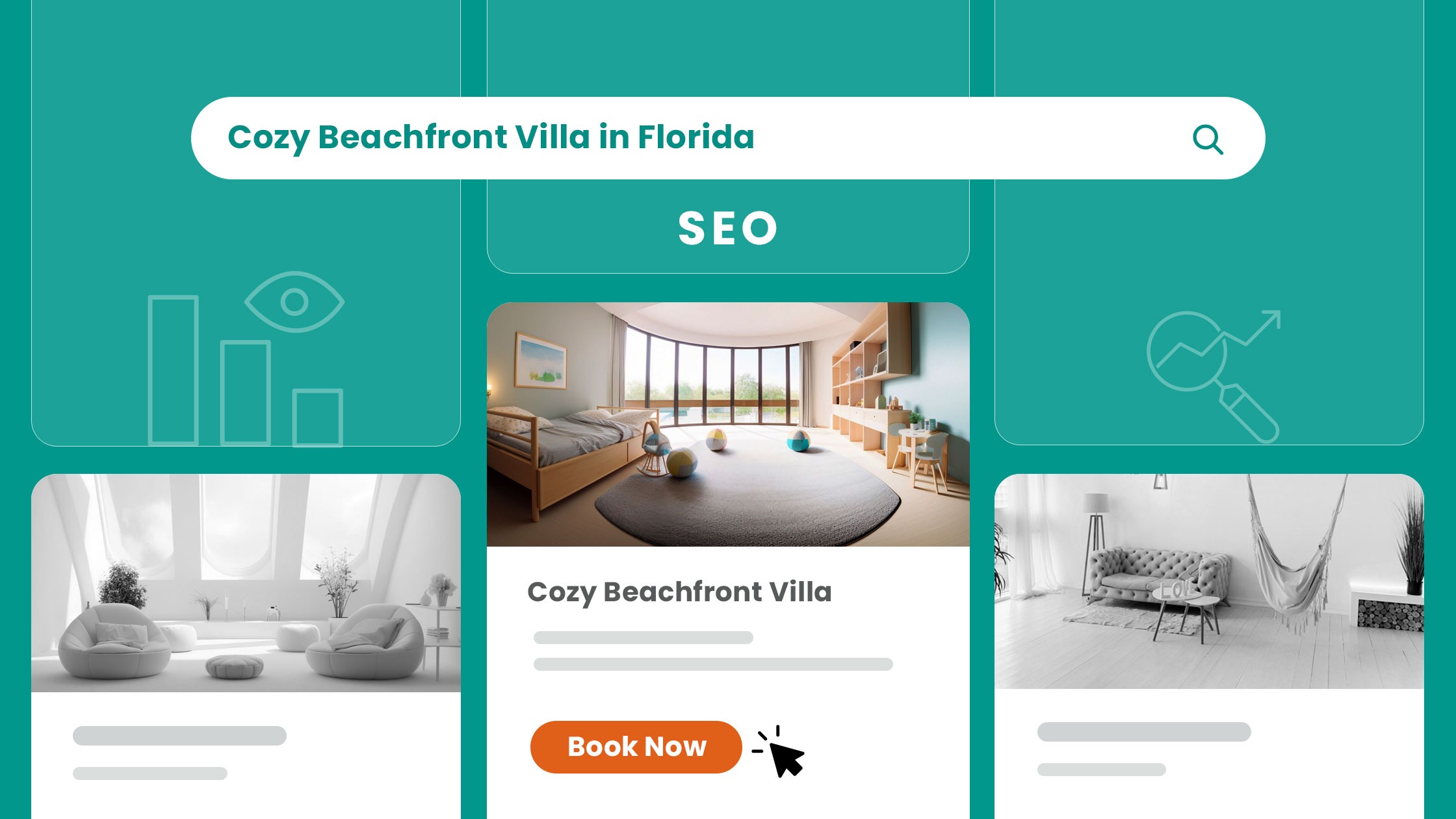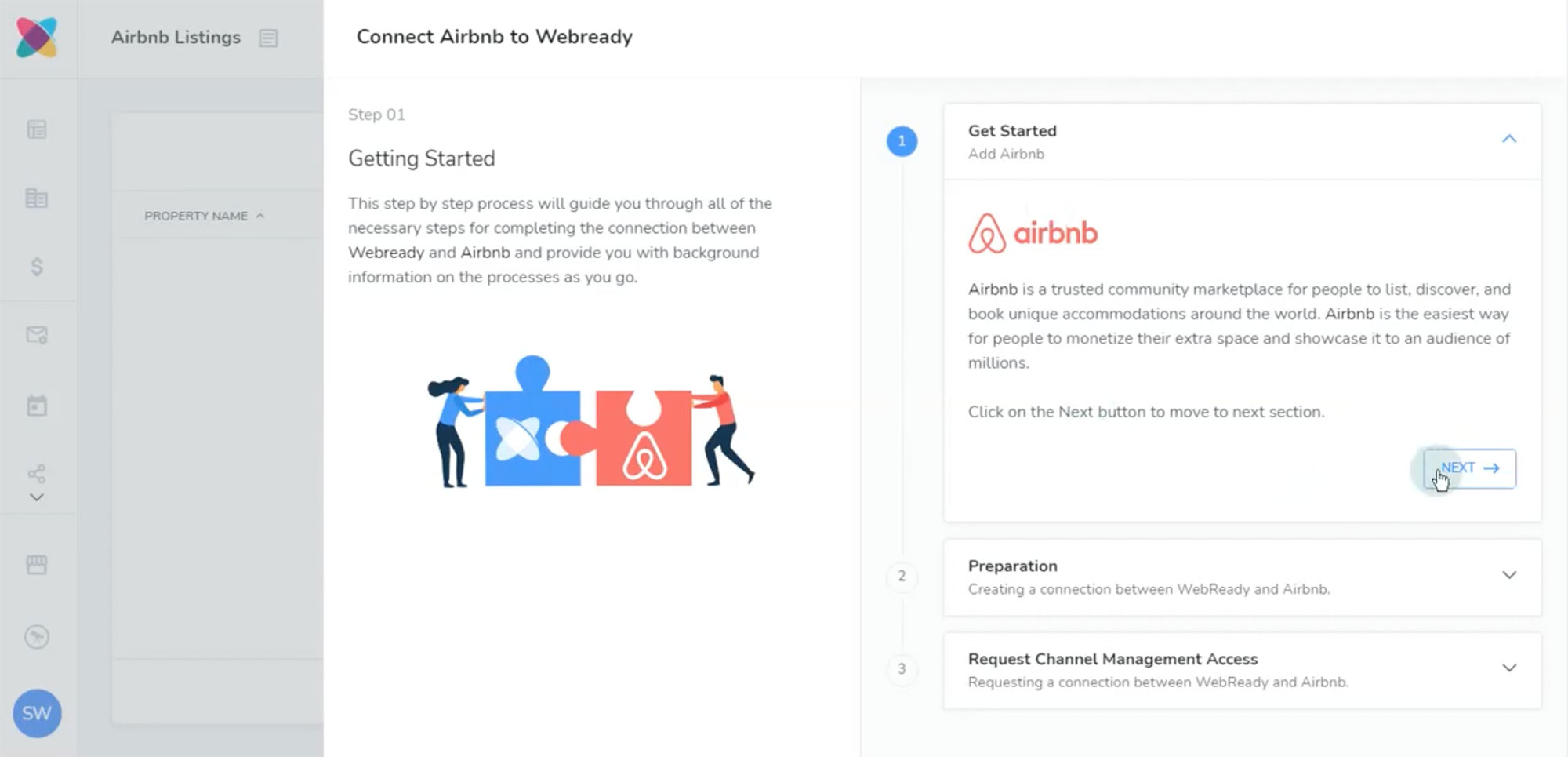How to Use Webready’s Built-in SEO Tools to Boost Your Vacation Rental’s Online Visibility
SEO is important for all websites, including vacation rental websites as it helps them rank higher on search engines like Google.
The higher your website ranks, the more visible it becomes to potential guests searching for vacation rentals. This can lead to increased direct bookings, saving you from third-party fees and giving you more control over your business.
One study shows that 93% of online experiences begin with a search engine, which highlights how crucial SEO is to capture potential guests’ attention.
Webready’s built-in SEO tools make it easy to customize key elements like metadata, meta tags, structured data, and more. Additionally, Webready ensures your website is mobile optimized with good page speeds, making it search engine-friendly without the need for technical expertise.
While it simplifies the process, hosts still have control over further optimizing their content and strategy. This foundation allows you to focus on other aspects of managing your property while ensuring your website is set up for success with search engines.
Why SEO Matters for Vacation Rental Hosts
SEO is essential for vacation rental hosts as it directly impacts how easily potential guests can find your website. Here are some key reasons why SEO matters for vacation rental hosts:
- More Visibility: The higher your website ranks on search engines, the more likely potential guests will see your listing.
- Direct Bookings: Good SEO brings in organic traffic, leading to more direct bookings and fewer third-party fees.
- Higher Rankings: Websites optimized for SEO tend to rank better on Google. Studies show 75% of users don’t scroll past the first page of results.
- Long-Term Benefits: SEO creates lasting visibility for your listing, driving consistent traffic and bookings over time.
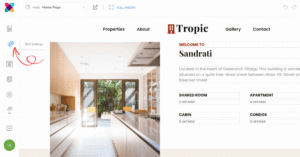
How to Access and Use SEO Tools on Webready
Accessing the SEO tools on Webready is simple and user-friendly. Follow these steps:
- Login to Your Webready Account: Ensure you are logged into your Webready account where your website is hosted.
- Navigate to the Editor: Select the website you wish to optimize for SEO and click on “Edit” to open the editor.
- Click on the Left Panel: On the left side of the editor screen, you will find several options. Locate and click on the second button from the top, which is labeled SEO Settings (as shown in the image above).
- Customize SEO Settings: From here, you can adjust the SEO metadata, including page title, meta descriptions, and social media sharing tags for each page.
These easy-to-use settings allow you to optimize your vacation rental website for better visibilit
Step-by-Step SEO Optimization for Your Webready Vacation Rental Website
1. Keyword Research for Your Vacation Rental Website
Keyword research is the most crucial step in making your vacation rental website visible on search engines. Keywords are the words and phrases potential guests use to search for properties like yours. By including the right keywords on your website, you can attract more visitors and increase your bookings.
Here’s how to approach keyword research, even if you’re new to SEO:
- Start by Thinking Like a Guest
Put yourself in the shoes of someone looking to book a vacation rental. What words or phrases would they type into Google? Think about location-based searches, amenities, or types of properties. For example, if you have a beachside villa in Florida, potential keywords could be “beachfront villa Florida,” “Florida vacation rental,” or “oceanfront house in Florida.”
- Focus on Location-Based Keywords
Since vacation rentals are often specific to a location, location-based keywords are vital. Make sure to include the city, town, or area where your property is located. For example, if you have a rental in Paris, use keywords like “Paris vacation rental,” “holiday home in Paris,” or “vacation apartment near Eiffel Tower.”
- Use Simple Free Tools
You don’t need expensive tools to get started with keyword research. Free tools like Google’s Keyword Planner, Ubersuggest, or AnswerThePublic can help you generate ideas and see what people are searching for. Simply type in a keyword, and these tools will suggest variations and give you an idea of how popular these terms are.
- Check Out Competitors
Look at how competitors in your area are using keywords on their websites. See what words appear in their titles, headings, and descriptions. While you don’t want to copy them directly, you can get inspiration from how they optimize their content.
Example: If you’re renting out a lakeside cabin in Michigan, focus on terms like “lake cabin rental Michigan,” “waterfront vacation home Michigan,” or “family cabin getaway Michigan.” These will help you target guests searching specifically for lakeside experiences.
By focusing on what guests are searching for and using the right keywords strategically, your vacation rental website can rank higher on search engines, helping you attract more direct bookings. Remember, keyword research doesn’t have to be overwhelming—it’s about understanding your audience and making sure your website speaks their language.

2. Optimizing Metadata for Higher Search Engine Rankings
After completing your keyword research, the next step is to optimize your metadata, which includes the page title, description, and meta tags. These elements help search engines understand your page content and are crucial for ranking.
Page Title: The page title is the main heading that appears on search engine results. It tells both search engines and users what your page is about. Keep your title concise (under 70 characters) and include your keyword in it. For example, “Cozy Beachfront Villa in Florida.”
Description: The description is a brief summary of your page shown under the title in search results. It provides users with more context. Aim for 150-160 characters, naturally using your keywords like “vacation rental” or “Florida beachfront villa” to encourage clicks.
Meta Tags: Meta tags help categorize your content for search engines. In Webready, you can customize these in the SEO settings. Be sure to add relevant keywords such as “Florida vacation rental” or “beachfront villa” to increase your chances of appearing in search results.
By optimizing these elements, you ensure that search engines can rank your page better, making it more visible to potential guests.
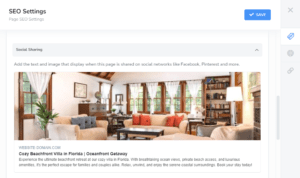
3. Optimizing Social Sharing for Greater Visibility
Social sharing helps your vacation rental website gain more visibility across platforms like Facebook and Pinterest. When someone shares your webpage, the preview includes a title, description, and image. Webready makes it easy to customize this.
To optimize:
- Add a compelling title that encourages clicks, like “Stunning Beachfront Villa in Florida.”
- Write a concise description highlighting the main feature, such as “Enjoy breathtaking views and private access to the beach.”
- Upload a high-quality image representing your rental for an eye-catching preview.
By optimizing these elements, you’ll make your listings more appealing on social media, leading to increased engagement and bookings.

4. Optimizing Meta Tags for Better SEO
Meta tags are snippets of text that describe a page’s content, helping search engines understand what your site is about. In Webready, you can customize meta tags such as the canonical URL, Open Graph tags, and custom meta tags.
- Canonical Tag: This tells search engines which version of your webpage is the primary one. For example, if your site has duplicate content, the canonical tag ensures that only the main page is indexed, avoiding confusion for search engines.
- Open Graph Tags: These tags control how your webpage appears when shared on social media. For example, you can set “Beachfront Villa Florida” as your site name, and “website” as the type.
By filling these fields in Webready, your website becomes more search-friendly and social media-optimized, making your vacation rental more visible across multiple platforms.
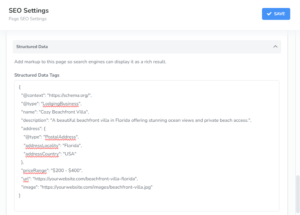
5. Structured Data for Enhanced Search Results
Ever seen Google results that show prices, ratings, or other details right in the search results? That’s thanks to structured data. It helps search engines pull out key information, like property type or pricing, and display it right up front, making it more appealing to searchers.
In Webready, adding structured data is simple. You can use tools like ChatGPT to help write structured data, such as listing the name of your property, location, and more. Just tell ChatGPT what details you need, and it can generate structured data for you to paste directly into Webready’s settings.
Open ChatGPT and type a request like this: “Can you generate structured data in JSON-LD format for my vacation rental website? My property is named ‘Beachfront Villa,’ located in Florida, and priced at $200 per night.”
This ensures your property stands out in search results with rich, useful information for potential guests.
6. Leveraging SEO Insights and Analytics
Once you’ve optimized your Webready website for SEO, the next crucial step is monitoring your site’s performance using analytics tools like Google Analytics, Google Tag Manager, and Facebook Pixel. These tools help track visitor activity, such as how users find your website, which pages they visit, and how long they stay.
For example, with Google Analytics, you can track your traffic sources to see if users are coming from organic search, social media, or referrals. Facebook Pixel helps you understand user behavior from Facebook ads.
Benefits:
- Understand which pages and keywords drive the most traffic.
- Optimize underperforming content based on user activity.
- Improve your SEO strategy by identifying what works and what doesn’t.
Using this data empowers you to make smarter decisions, refine your content, and ultimately increase direct bookings by better aligning with what potential guests are searching for.
Conclusion
SEO is essential for vacation rental websites to drive direct bookings, increase visibility, and reduce reliance on third-party platforms. By using Webready’s SEO tools, you can easily implement key optimizations such as keyword research, metadata, and social sharing.
These steps help ensure your website ranks higher on search engines, attracting more potential guests. With ongoing use of analytics to track performance, you’ll be able to refine your strategy and focus on growing your business while achieving long-term success with direct bookings.
latest video
Boost Your Bookings with Proven Strategies!
Join our community and access exclusive tips, tools, and resources designed for property managers to maximize their rental income.

